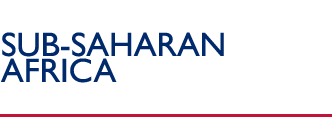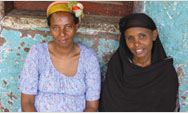
Malawi
USAID/Malawi launches Interactive Radio Instruction

Malawi’s education system struggles with large class sizes, limited supplies, and insufficiently
trained teachers. The USAID-supported Tikwere interactive radio instruction project is part of an
effort to improve the teaching and learning conditions for over 3 million pupils in the primary
schools. [more].
USAID's Strategy in Malawi
In May 2004, Malawi conducted its third multi-party national election
since emerging from decades of one-party autocracy in 1994.
In his first year in office, Malawi’s new President,
Bingu wa Mutharika, has demonstrated particular commitment
to economic reform, fiscal restraint, and efficient reinforcement
of anti-corruption measures. The new administration’s
actions also were a key factor in Malawi’s selection
as a Millennium Challenge Account threshold country. USAID
will encourage the government of Malawi as it identifies target
areas for improvement and submits a proposal to undertake
policy reforms to remedy deficient areas. USAID’s program
in Malawi focuses on rural economic growth, improved governance,
HIV/AIDS and family health, and basic education.
INCREASING RURAL ECONOMIC GROWTH
Malawi’s development is impeded by dependence on tobacco
for 60 percent of export earnings and poor incentives for
foreign and domestic investment. To improve economic potential,
USAID funds technology transfer, technical assistance, and
training to increase agricultural productivity of smallholder
farmers. In FY 2004, the value of agricultural products marketed
by farmers associations reached $2.6 million, continuing the
phenomenal growth that has seen sales double every year for
the past three years. The gross value of non-tobacco crops
sold locally and internationally increased to $2.2 million.
USAID continued to promote the growth of the dairy industry
through 48 dairy associations with over 5,700 members, and
milk sales grew by 54 percent from FY 2003 to FY 2004. USAID
technical assistance and training is enabling 650 communities
to adopt improved natural resource management techniques and
to improve marketing of natural resource-based products.
STRENGTHENING DEMOCRACY AND CIVIL SOCIETY
The jury is still out on the state of Malawi’s democracy.
Malawi’s 2004 Freedom House ranking for Political Rights
improved. However, these rankings were compiled prior to the
highly flawed processes leading up to the May 2004 elections.
USAID supports civic involvement in the rule of law for poor
Malawian citizens. In particular, the program is building
the numbers, skills, and reach of paralegal services and alternative
dispute resolution mechanisms. Surveys undertaken in FY 2004
found that 54 percent of the citizens in USAID target areas
participated in democratic processes by attending meetings,
raising issues in a public forum, or approaching a local leader,
compared with 36 percent in FY 2003. Through USAID support,
14 paralegals and 732 community-based volunteers helped to
resolve 2,469 cases outside of the formal court system, with
particular emphasis on labor issues, inheritance, divorce
and property settlements, and domestic violence.
IMPROVING CARE FOR HIV/AIDS AND HEALTH
Life expectancy at birth is now under 40 years, due to the
effects of the adult HIV/AIDS prevalence rate of 15 percent.
The infant mortality rate (104 per 1,000 live births) and
the child malnutrition rate (49 percent of children under
age five) are among the highest in Africa. USAID works in
partnership with the GOM and several nongovernmental organizations
to prevent HIV/AIDS, particularly among adolescents, emphasizing
the “ABC” approach (Abstinence, Being faithful,
and correct and consistent use of Condoms, where appropriate).
HIV/AIDS funding also is being used to expand care and support
to individuals and communities affected by HIV/AIDS, including
orphans and vulnerable children. USAID-financed abstinence-based
programs reached 80,000 youth in 370 schools, and condom sales
to high-risk groups reached almost 8.5 million. USAID’s
health program is addressing malaria, the number one cause
of death for children under five years of age, through continued
promotion of insecticide-treated bed nets. The percentage
of households using bed nets increased from 13 percent in
2000 to 43 percent in 2004.
EDUCATION
While access to education has improved in Malawi since 1994,
when primary school fees were eliminated, education quality
is still of great concern. USAID’s basic education program
continues to improve teachers’ professional skills,
develop schools’ abilities to respond to the needs of
the student population, and decrease the impact of HIV/AIDS
in the sector. Over 30 Malawians sponsored by USAID to get
teaching degrees from U.S. universities have returned to their
country to take positions in teacher training colleges. At
the classroom level, USAID provided training in instructional
skills, class management, and supervisory skills to over 2,000
untrained primary school teachers. At the grass roots level,
38 percent of school committees in the four new USAID target
districts have initiated activities to mitigate the impact
of HIV/AIDS in their communities.
Back to Top ^
|


